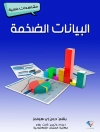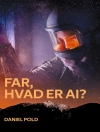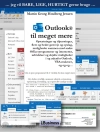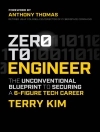MACHINE LEARNING AND DATA SCIENCE
Written and edited by a team of experts in the field, this collection of papers reflects the most up-to-date and comprehensive current state of machine learning and data science for industry, government, and academia.
Machine learning (ML) and data science (DS) are very active topics with an extensive scope, both in terms of theory and applications. They have been established as an important emergent scientific field and paradigm driving research evolution in such disciplines as statistics, computing science and intelligence science, and practical transformation in such domains as science, engineering, the public sector, business, social science, and lifestyle. Simultaneously, their applications provide important challenges that can often be addressed only with innovative machine learning and data science algorithms.
These algorithms encompass the larger areas of artificial intelligence, data analytics, machine learning, pattern recognition, natural language understanding, and big data manipulation. They also tackle related new scientific challenges, ranging from data capture, creation, storage, retrieval, sharing, analysis, optimization, and visualization, to integrative analysis across heterogeneous and interdependent complex resources for better decision-making, collaboration, and, ultimately, value creation.
Table des matières
Preface xiii
Book Description xv
1 Machine Learning: An Introduction to Reinforcement Learning 1
Sheikh Amir Fayaz, Dr. S Jahangeer Sidiq, Dr. Majid Zaman and Dr. Muheet Ahmed Butt
1.1 Introduction 2
1.2 Reinforcement Learning Paradigm: Characteristics 11
1.3 Reinforcement Learning Problem 12
1.4 Applications of Reinforcement Learning 15
2 Data Analysis Using Machine Learning: An Experimental Study on UFC 23
Prashant Varshney, Charu Gupta, Palak Girdhar, Anand Mohan, Prateek Agrawal and Vishu Madaan
2.1 Introduction 23
2.2 Proposed Methodology 25
2.3 Experimental Evaluation and Visualization 31
2.4 Conclusion 44
3 Dawn of Big Data with Hadoop and Machine Learning 47
Balraj Singh and Harsh Kumar Verma
3.1 Introduction 48
3.2 Big Data 48
3.3 Machine Learning 53
3.4 Hadoop 55
3.5 Studies Representing Applications of Machine Learning Techniques with Hadoop 57
3.6 Conclusion 61
4 Industry 4.0: Smart Manufacturing in Industries — The Future 67
Dr. K. Bhavana Raj
4.1 Introduction 67
5 COVID-19 Curve Exploration Using Time Series Data for India 75
Apeksha Rustagi, Divyata, Deepali Virmani, Ashok Kumar, Charu Gupta, Prateek Agrawal and Vishu Madaan
5.1 Introduction 76
5.2 Materials Methods 77
5.3 Concl usion and Future Work 86
6 A Case Study on Cluster Based Application Mapping Method for Power Optimization in 2D No C 89
Aravindhan Alagarsamy and Sundarakannan Mahilmaran
6.1 Introduction 90
6.2 Concept Graph Theory and NOC 91
6.3 Related Work 94
6.4 Proposed Methodology 97
6.5 Experimental Results and Discussion 100
6.6 Conclusion 105
7 Healthcare Case Study: COVID-19 Detection, Prevention Measures, and Prediction Using Machine Learning & Deep Learning Algorithms 109
Devesh Kumar Srivastava, Mansi Chouhan and Amit Kumar Sharma
7.1 Introduction 110
7.2 Literature Review 111
7.3 Coronavirus (Covid19) 112
7.4 Proposed Working Model 118
7.5 Experimental Evaluation 130
7.6 Conclusion and Future Work 132
8 Analysis and Impact of Climatic Conditions on COVID-19 Using Machine Learning 135
Prasenjit Das, Shaily Jain, Shankar Shambhu and Chetan Sharma
8.1 Introduction 136
8.2 COVID-19 138
8.3 Experimental Setup 141
8.4 Proposed Methodology 142
8.5 Results Discussion 143
8.6 Conclusion and Future Work 143
9 Application of Hadoop in Data Science 147
Balraj Singh and Harsh K. Verma
9.1 Introduction 148
9.2 Hadoop Distributed Processing 153
9.3 Using Hadoop with Data Science 160
9.4 Conclusion 164
10 Networking Technologies and Challenges for Green IOT Applications in Urban Climate 169
Saikat Samanta, Achyuth Sarkar and Aditi Sharma
10.1 Introduction 170
10.2 Background 170
10.3 Green Internet of Things 173
10.4 Different Energy–Efficient Implementation of Green IOT 177
10.5 Recycling Principal for Green IOT 178
10.6 Green IOT Architecture of Urban Climate 179
10.7 Challenges of Green IOT in Urban Climate 181
10.8 Discussion & Future Research Directions 181
10.9 Conclusion 182
11 Analysis of Human Activity Recognition Algorithms Using Trimmed Video Datasets 185
Disha G. Deotale, Madhushi Verma, P. Suresh, Divya Srivastava, Manish Kumar and Sunil Kumar Jangir
11.1 Introduction 186
11.2 Contributions in the Field of Activity Recognition from Video Sequences 190
11.3 Conclusion 212
12 Solving Direction Sense Based Reasoning Problems Using Natural Language Processing 215
Vishu Madaan, Komal Sood, Prateek Agrawal, Ashok Kumar, Charu Gupta, Anand Sharma and Awadhesh Kumar Shukla
12.1 Introduction 216
12.2 Methodology 217
12.3 Description of Position 222
12.4 Results and Discussion 224
12.5 Graphical User Interface 225
13 Drowsiness Detection Using Digital Image Processing 231
G. Ramesh Babu, Chinthagada Naveen Kumar and Maradana Harish
13.1 Introduction 231
13.2 Literature Review 232
13.3 Proposed System 233
13.4 The Dataset 234
13.5 Working Principle 235
13.6 Convolutional Neural Networks 239
13.6.1 CNN Design for Decisive State of the Eye 239
13.7 Performance Evaluation 240
13.8 Conclusion 242
References 242
Index 245
A propos de l’auteur
Prateek Agrawal, Ph D, completed his BTech in computer science engineering from Uttar Pradesh Technical University, Lucknow, India and MTech from ABV-IIITM, Gwalior, India. He also received his Ph D from IKG-Punjab Technical University, Punjab, India. He has more than ten years of research and teaching experience. He has worked as a post-doctoral researcher at the department of ITEC, University of Klagenfurt, Austria and also serves as an associate professor in the school of computer science engineering, Lovely Professional University, India. He has authored more than 50 research papers in various peer reviewed journals and conferences. He is a life member of IET research society. He is a reviewer and editorial member of many journals of high repute. He also served as technical program committee member of many international conferences.
Charu Gupta, Ph D, graduated with her BE and MTech in computer science and engineering, with honors. She completed her doctoral degree at the Department of Computer Science, Banasthali Vidyapith, Rajasthan, India. Presently serving as assistant professor at Bhagwan Parshuram Institute of Technology, she has over 10 years of teaching experience. She is a faculty coordinator (Delhi Section) of Free and Open Source Cell (FOSS cell) from the International Centre for Free and Open Source Software (ICFOSS), Govt. of Kerala, India. She is also the faculty co-ordinator of the e-Yantra Lab setup initiative (e LSI) in collaboration with IIT Bombay in the Department of Computer Science and Engineering, BPIT. She also has numerous papers in scientific and scholarly journals to her credit.
Vishu Madaan, Ph D, received her BTech and MTech degrees in computer science engineering from Lovely Professional University, Phagwara, India and earned her Ph D in computer science from IKG-Punjab Technical University, Punjab. She is an assistant professor with Lovely Professional University and has more than eight years of teaching and research experience. She has authored more than 30 research articles in peer-reviewed conferences and journals. She is also a member of IEEE and is a reviewer for many international conferences and technical journals.
Anand Sharma, Ph D, received his Ph D in engineering from MUST, Lakshmangarh, his MTech from ABV-IIITM, Gwalior and BE from RGPV, Bhopal. He has been working with Mody University of Science and Technology, Lakshmangarh for over 10 years and has more than 14 years of experience of teaching and research. He has pioneered research in the areas of information systems, information security, Io T, knowledge management and machine learning. He is the Vice-Chairman of CSI-Lakshmangarh Chapter and Student Branch Coordinator of CSI-MUST, student branch. He has authored or edited five books and has more than 70 papers in scientific and scholarly journals and conferences. He has organized more than 15 conferences, seminars, and workshops and is serving on the editorial boards of several journals as and is on the program committees of several international conferences.
Nisheeth Joshi, Ph D, is an associate professor at Banasthali Vidyapith, India. He did his Ph D in the area of natural language processing and is the recipient of the prestigious ISTE-U.P. Government National Award for Outstanding Work Done in Specified Areas of Engineering and Technology. He has authored several papers in scientific and technical journals and conferences. He has also been a mentor and consultant to various start-ups working in the areas of cognitive computing, natural language processing, speech processing, multimodal information retrieval and machine translation. He was also a consultant to C-DAC Pune where he developed the evaluation methodology for the Mantra Machine Translation System. This Machine Translation System is being used by Rajya Sabha, the Upper House of Parliament of India and Department of Official Languages, with the Government of India. In addition, he has two technology transfers and four copyrights to his credit.












